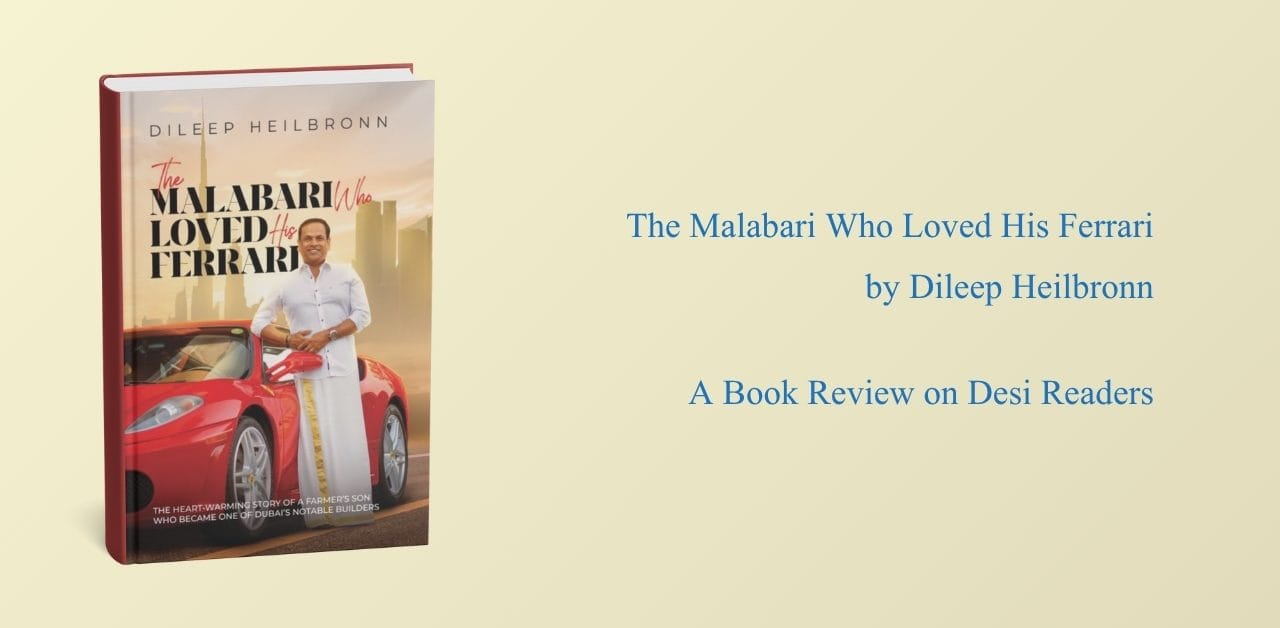The Malabari Who Loved His Ferrari by Dileep Heilbronn, a book review
“Bound for Dubai—poor in cash, but rich in dreams.” Though this is not exactly the opening line from the book, I would still think it is a significant one in The Malabari Who Loved His Ferrari, Dileep’s memoir. This line encapsulates the soul of Dileep Heilbronn’s life journey, and also this memoir. This narrative stands apart in the crowded memoir genre through its raw honesty and refreshing straightforwardness. Unlike many success stories that polish their rough edges, Heilbronn’s account remains unflinchingly authentic, offering readers not just a polished victory lap but the complete, often messy journey. His willingness to share both triumphs and stumbles—whether financial struggles, professional missteps, or personal challenges—makes this book a rare gem. There are no grandiose claims or exaggerated heroics, just a man telling his story with the same clarity and humility that likely guided his real-life decisions. This straightforward approach transforms the memoir from a mere chronicle of achievements into a relatable blueprint for resilience, making it a distinct addition to the genre.
Unlike many memoirs that glorify success through polished narratives of relentless hustle and inevitable triumph, The Malabari Who Loved His Ferrari stands out for its refreshing honesty and multidimensional portrayal of achievement. While books like Elon Musk’s or Phil Knight’s memoirs focus heavily on disruptive innovation and corporate battles, Dileep Heilbronn’s story weaves together vulnerability, cultural pride, and the quiet joys of ordinary moments—like collecting pencils or writing heartfelt letters—alongside entrepreneurial grit. His narrative rejects the typical “lone genius” trope, instead celebrating mentors, family, and serendipity as equal partners in his journey. What truly distinguishes this memoir is its balance: the Ferraris symbolise ambition, but the Kerala dhoti on the cover reminds us that success loses meaning if it erases where you began. Here, wealth isn’t an end goal but a tool for deeper connections and legacy-building, making it a rare memoir that resonates with both dreamers and realists.

Dileep’s early recollections of his humble beginnings resonate deeply. He openly shares how, as a schoolboy, he would watch wealthier classmates arrive in luxury cars while he travelled by cycle rickshaw. These moments of childhood envy and aspiration are rendered with such vivid honesty that they become universal. What makes his account remarkable is not just the admission of these dreams but the tangible path he carved to achieve them. The boy who once gazed longingly at cars grew into the man who would own a fleet of Ferraris, not through luck or shortcuts but through relentless hard work and an unwavering belief in his vision. His journey underscores a vital lesson: childhood dreams, no matter how grand, can materialise when fueled by passion and perseverance. The memoir demystifies success, showing it as the product of daily discipline and long-term commitment rather than sudden fortune. So, next time you read someone saying you can succeed just by thinking, don’t believe that! Success is about going to the same place with renewed determination every day, rather than going there once and thinking everything will fall in line on its own. No, it doesn’t work like that! Dileep’s candid take on his hard work, grit and courageous decisions in life tells us how success needs to be achieved, not plucked from the tree of convenience.
The chapters detailing the early years of Heilbronn Construction LLC are a masterclass in entrepreneurial grit. Dileep paints a vivid picture of his “one-man-does-it-all” phase, where he single-handedly managed every aspect of the business, from client meetings to site supervision. These passages are particularly inspiring because they strip away the glamour often associated with entrepreneurship, revealing instead the gruelling reality of building something from nothing. His candid descriptions of financial strain, sleepless nights, and the weight of responsibility make his eventual success all the more meaningful. As Dubai underwent its dramatic transformation in the early 2000s, Heilbronn Construction LLC grew alongside it, contributing to the city’s skyline and infrastructure. This parallel growth—personal and professional, individual and collective—adds depth to the narrative, illustrating how individual ambition can align with and even fuel broader societal progress.
And before I close this review, let me discuss how I felt after I completed reading it. First of all, and most importantly, reading this book reshaped my perspective on success and fulfilment. One quote that lingered with me long after I turned the final page was, “We are happy only when people around us are.” This simple yet profound idea reflects Dileep’s holistic approach to life. His decision to step back from day-to-day operations in his prime—a semi-retirement of sorts—speaks volumes about his priorities. While he enjoys the fruits of his labour, including his beloved fast cars, he never lets material gains overshadow human connections or personal well-being. (If I may ask, can we do that? So conveniently, and the way Dileep could do?) His Ferraris, rather than being mere status symbols, become metaphors for what he has achieved without losing sight of who he is. I have tried to recalibrate my ambitions, dreams, and life goals. Although it’s a long journey that’s still in its early stages, I would love to work the way Dileep does. And like me and many other Indian youths navigating the pressures of modern ambition, Dileep’s journey offers a perfect model: one where success is pursued passionately but never at the cost of one’s roots, relationships, or humanity. His ability to remain grounded despite his achievements is a testament to the values instilled in him during his modest upbringing.
I wholeheartedly recommend The Malabari Who Loved His Ferrari to aspiring entrepreneurs, young professionals, and anyone in search of an authentic success story. Dileep’s passion for creative writing and painting, which he nurtures alongside his business ventures, adds another layer of inspiration. It reminds readers that success need not be one-dimensional—that one can excel in multiple arenas without sacrificing authenticity. His memoir is more than a personal account; it serves as a guide for achieving greatness while remaining true to oneself. Whether you dream of fast cars, towering skyscrapers, or simply a life well-lived, this book will leave you motivated, reflective, and ready to chase your vision with both determination and grace.
Get a copy from Amazon India – click here.
Ravi for Desi Readers
…
The Malabari Who Loved His Ferrari by Dileep Heilbronn, a book review
- Book Final Rating
Summary
Candidly refreshing, relatable, authentic and inspiring… a perfect memoir to be read by youths and ambitious people.
